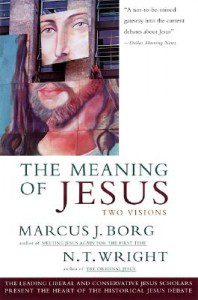 • Marcus Borg & N.T. Wright: The Meaning of Jesus: Two Visions, HarperSanFrancisco, 1998.
• Marcus Borg & N.T. Wright: The Meaning of Jesus: Two Visions, HarperSanFrancisco, 1998.
Four years ago, I had the privilege of interviewing Marcus Borg and N.T. Wright for this newspaper when they met for a dialogue — no one wanted to call it a debate — at Regent College. Both men are members of the Anglican church and historians who specialize in ‘the historical Jesus,’ but they have very different understandings of who and what Jesus was, and they spent the better part of six hours fleshing out their many disagreements.
But I was particularly struck by what took place after the seminar was over. Bidding farewell in the atrium, the two men hugged, and Wright said to Borg, “We’ll have to do this again sometime.”
And so they have. In The Meaning of Jesus, Borg and Wright take turns, writing alternate chapters explaining their positions on such issues as the life, death and resurrection of Jesus, the second coming, the divinity of Jesus, and how faith in the historical Jesus affects Christian living today.
Borg, a member of the Jesus Seminar, comes across as the more scientific, which is both a strength and a weakness. For instance, he is quite clear, in a way Wright is not, that he believes the synoptic gospels offer a better look at the historical Jesus than the gospel of John. But Borg’s method of defining Jesus according to cross-cultural categories prevents him from giving full weight to those aspects of Jesus which were, shall we say, more unique.
Wright, a former tutor at Oxford, plunges himself into first century Judaism and enables us to see what words like ‘messiah,’ ‘son of God’ and ‘resurrection’ would have meant in that context. Israel’s story, he argues, was one of exile and being abandoned by God; when Jesus told stories of people awaiting a bridegroom or an employer, he was not pointing forward to some sort of second coming, but underscoring the significance of his own first-century mission: in him and in his movement, Israel’s God was returning.
Despite their differences, Borg and Wright have much in common. Both authors reject the modernist belief, shared by some Christians, that the universe ticks along on its own and that God, who is ‘out there’ somewhere, intervenes once in a while. Instead, both speak of God as transcendent yet immanent, and decisively present in Jesus.
Borg and Wright began this project by worshipping together at Lichfield Cathedral, where Wright is the dean. Hopefully, The Meaning of Jesus will encourage others to come to a similarly deeper understanding of the issues and the people involved in ‘historical Jesus’ research.
— A version of this article first appeared in BC Christian News.












